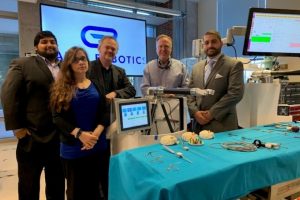
That medical technology startup Galen Robotics relocated its headquarters from Silicon Valley to Baltimore is notable enough. But one of the main reasons why is unique and a boon both to Galen and The Johns Hopkins University: the company’s internship program.
Galen’s steady-hand surgical robots are based on technology developed by Russell Taylor, director of Johns Hopkins’ Laboratory for Computational Sensing and Robotics. Two years ago, Taylor asked Bruce Lichorowic, Galen’s CEO, if the company would be interested in using graduate students from Taylor’s lab as interns.
Lichorowic, a veteran entrepreneur, was wary but agreed to Taylor’s proposal, and four of the professor’s students started working for Galen. Dave Saunders, Galen’s chief technology officer, soon told Lichorowic the interns were as good as the company’s Silicon Valley engineers.
“And, by the way,” Saunders added, “can we get more?”
All of the interns became Galen employees who in turn hired 15 interns who worked at the company this past summer. The majority came from Johns Hopkins.
“Without Dr. Taylor, we’d probably still be in Silicon Valley,” says Lichorowic. “Because of his cooperation and his world renowned lab, it made sense for us to be here, to do the research here, to do the development here and grow the company here in Baltimore.”
For Taylor, it’s a win-win arrangement. His students get startup business exposure and the chance to make money for their work. And he has students who better understand the Galen’s robots, a prototype of which is housed on campus, and keep pushing innovations.
“It’s an unusual relationship we were able to set up by working with Johns Hopkins Technology Ventures [JHTV] and the dean’s office,” says Taylor.
JHTV brought Lichorowic and Taylor together after Taylor kept his robot technology work afloat through grant money, including JHTV’s Cohen Translational Engineering Fund.
Taylor and a graduate student, the late Kevin Olds, invented a medical robot to mitigate the effect of hand tremors on surgeons working on a patient’s head or neck, areas where high precision is required. Galen is adapting the robot to handle a variety of surgeries, particularly in neurosurgery.
To operate the Galen robot, surgeons use disposable clips to attach their tools to the robot’s arm.
“The idea is the surgeon and robot are both holding surgical tools,” says Taylor, a consultant to Galen. “The robot feels the surgeon’s pull and moves the tool.”
Both Lichorowic and Taylor compare Galen’s technology to a car’s power steering.
“Surgical robots are simply making you do something you’re already doing a little easier,” says Lichorowic.
The robot also can be programmed to bring a tool to an exact location on the body and come in and out on a straight line, decreasing the chance of complications.
Galen also is combining the value of surgical robotics with a cloud data model.
“The other side of the medical robotics coin is that they are extremely well-suited for being instruments of massive data collection,” says Lichorowic.
Using Silicon Valley-pioneered cloud data collection, analytics and machine learning, Galen will be able to analyze all surgery outcomes. The best techniques can then be taught to residents and offered to surgeons.
“We’re bringing some of Silicon Valley here, and at the same time we are gaining the rich heritage of surgical robotics and the medical expertise and continuous innovation being driven by of Johns Hopkins,” says Lichorowic.
Galen has demonstrated its technology to hospitals across the country, and the company expects to do verification and validation testing in early 2020, according to Lichorowic. It has received guidance from the U.S. Food and Drug Administration to proceed with a 510K De Novo Classification Request for novel medical devices.
The company has raised $7 million to date and is in the midst of a $25 million Series A round, Lichorowic says. It also recently appointed to its board of directors Henry Brem, director of the Department of Neurosurgery and neurosurgeon-in-chief at The Johns Hopkins Hospital.
“Part of the value we bring to market is our relationship with Johns Hopkins,” says Lichorowic. “That relationship adds value to our company.”
Galen is settling in to its 5,000 square feet of office space in Baltimore’s Pigtown neighborhood, becoming the first business in the city to receive private investment for moving into a federally designated Opportunity Zone. The company’s employees include C-suite executives who, like Lichorowic, are in the process of relocating from Silicon Valley.
Galen also plans to continue its successful intern program next summer and is already looking for candidates.
“Our productivity goes sky high when they’re here, and we love them,” Lichorowic says.